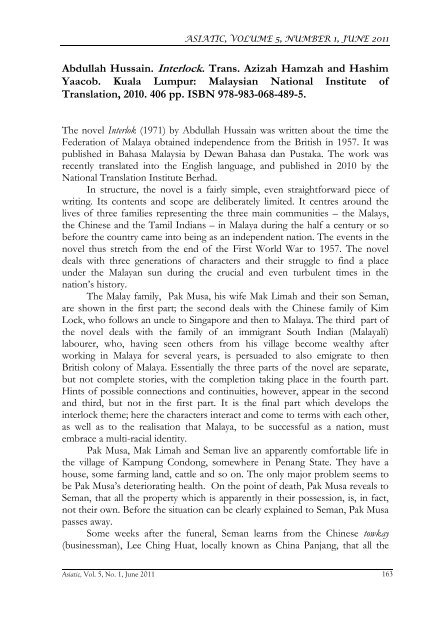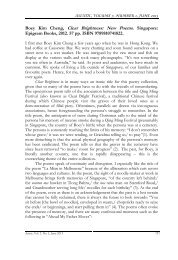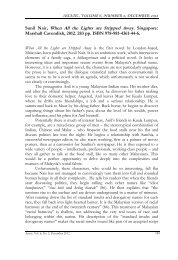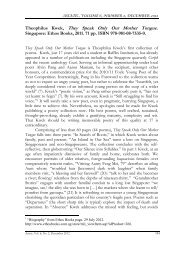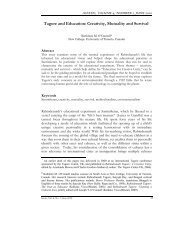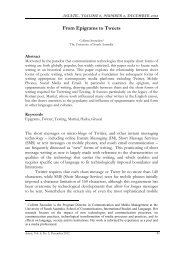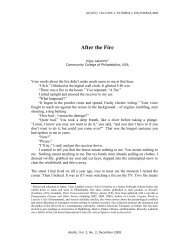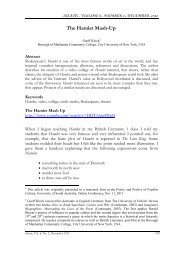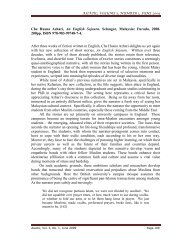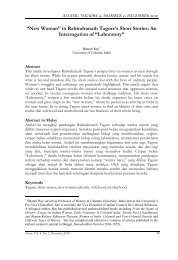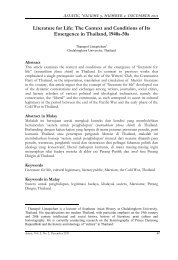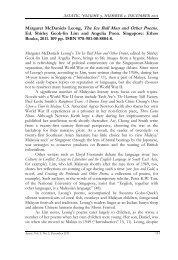Abdullah Hussain, Interlock. Trans. Azizah Hamzah and Hashim
Abdullah Hussain, Interlock. Trans. Azizah Hamzah and Hashim
Abdullah Hussain, Interlock. Trans. Azizah Hamzah and Hashim
Create successful ePaper yourself
Turn your PDF publications into a flip-book with our unique Google optimized e-Paper software.
ASIATIC, VOLUME 5, NUMBER 1, JUNE 2011<br />
<strong>Abdullah</strong> <strong>Hussain</strong>. <strong>Interlock</strong>. <strong>Trans</strong>. <strong>Azizah</strong> <strong>Hamzah</strong> <strong>and</strong> <strong>Hashim</strong><br />
Yaacob. Kuala Lumpur: Malaysian National Institute of<br />
<strong>Trans</strong>lation, 2010. 406 pp. ISBN 978-983-068-489-5.<br />
The novel Interlok (1971) by <strong>Abdullah</strong> <strong>Hussain</strong> was written about the time the<br />
Federation of Malaya obtained independence from the British in 1957. It was<br />
published in Bahasa Malaysia by Dewan Bahasa dan Pustaka. The work was<br />
recently translated into the English language, <strong>and</strong> published in 2010 by the<br />
National <strong>Trans</strong>lation Institute Berhad.<br />
In structure, the novel is a fairly simple, even straightforward piece of<br />
writing. Its contents <strong>and</strong> scope are deliberately limited. It centres around the<br />
lives of three families representing the three main communities – the Malays,<br />
the Chinese <strong>and</strong> the Tamil Indians – in Malaya during the half a century or so<br />
before the country came into being as an independent nation. The events in the<br />
novel thus stretch from the end of the First World War to 1957. The novel<br />
deals with three generations of characters <strong>and</strong> their struggle to find a place<br />
under the Malayan sun during the crucial <strong>and</strong> even turbulent times in the<br />
nation’s history.<br />
The Malay family, Pak Musa, his wife Mak Limah <strong>and</strong> their son Seman,<br />
are shown in the first part; the second deals with the Chinese family of Kim<br />
Lock, who follows an uncle to Singapore <strong>and</strong> then to Malaya. The third part of<br />
the novel deals with the family of an immigrant South Indian (Malayali)<br />
labourer, who, having seen others from his village become wealthy after<br />
working in Malaya for several years, is persuaded to also emigrate to then<br />
British colony of Malaya. Essentially the three parts of the novel are separate,<br />
but not complete stories, with the completion taking place in the fourth part.<br />
Hints of possible connections <strong>and</strong> continuities, however, appear in the second<br />
<strong>and</strong> third, but not in the first part. It is the final part which develops the<br />
interlock theme; here the characters interact <strong>and</strong> come to terms with each other,<br />
as well as to the realisation that Malaya, to be successful as a nation, must<br />
embrace a multi-racial identity.<br />
Pak Musa, Mak Limah <strong>and</strong> Seman live an apparently comfortable life in<br />
the village of Kampung Condong, somewhere in Penang State. They have a<br />
house, some farming l<strong>and</strong>, cattle <strong>and</strong> so on. The only major problem seems to<br />
be Pak Musa’s deteriorating health. On the point of death, Pak Musa reveals to<br />
Seman, that all the property which is apparently in their possession, is, in fact,<br />
not their own. Before the situation can be clearly explained to Seman, Pak Musa<br />
passes away.<br />
Some weeks after the funeral, Seman learns from the Chinese towkay<br />
(businessman), Lee Ching Huat, locally known as China Panjang, that all the<br />
Asiatic, Vol. 5, No. 1, June 2011 163
<strong>Interlock</strong><br />
property managed by Pak Musa in fact belongs to him. L<strong>and</strong> titles <strong>and</strong><br />
agreements are shown to Seman, but, being illiterate, Seman is unable to make<br />
sense out of the whole thing. Pak Musa’s debts amounting to around 10,000.00<br />
ringgit <strong>and</strong> the fact that his entire property is mortgaged to the Chinese<br />
businessman is confirmed by the Headman, Penghulu of the village. All of this<br />
comes as a shock to Seman <strong>and</strong> Mak Limah who herself has all along been in<br />
the dark about the situation. They are devastated. The villagers of Kampung<br />
Condong are shocked. The revelation of their real financial situation ruins<br />
Seman’s prospects of marriage with Upik, the daughter of Lebai Man, the local<br />
religious teacher. Refusing all help from the villagers, Seman decides to leave<br />
the village with his mother. No one seems to know their whereabouts.<br />
Lee Kim Hock, an unsuccessful farmer leaves China for the Southern<br />
Region with his only son of around ten, Ching Huat, is search of a better life;<br />
the way has been opened for by a visitor, Uncle Kok Leng, who returns to<br />
China loaded with English currency. In Singapore, the father <strong>and</strong> his son end<br />
up doing odd jobs. They eventually make their way to Penang. On the advice of<br />
an acquaintance, Kim Sui, Lee Kim Hock manages to buy a shop in Simpat<br />
Empat, Penang from a local Malay. The grocery shop thrives; Lee Kim Hock is<br />
unable to return to China due to the war between China <strong>and</strong> Japan, <strong>and</strong> when<br />
he learns that his wife is dead he sees no reason to return. On Kim Sui’s<br />
recommendation he acquires a mistress; eventually both he <strong>and</strong> his mistress<br />
succumb to opium. Lee Ching Huat, who has married Kim Sui’s daughter, takes<br />
over the business, which he exp<strong>and</strong>s. His four children show different traits.<br />
Two of them, his second son Yew Seng <strong>and</strong> daughter Eng Poh, seem to have<br />
developed a certain fondness for the Malays. This is something which upsets<br />
Lee Chin Huat, who is fiercely Chinese in his outlook <strong>and</strong> values <strong>and</strong> even<br />
desires to die in China. Family quarrels become frequent.<br />
A crisis develops when Yew Seng <strong>and</strong> Eng Poh show sympathy towards<br />
Seman’s family; they protest at the harshness with which Chin Huat deals with<br />
them. He has all along regarded the Malays as merely jungle people, <strong>and</strong> thus<br />
basically uncivilised. They are also lazy. Chin Huat wishes to drive Seman <strong>and</strong><br />
Mak Limah from their house, which legally belongs to him; he has already<br />
issued instructions for them to be evicted. Disgusted, he even wonders if the<br />
two are really his children. He plans to disown Yew Seng, <strong>and</strong> to h<strong>and</strong> over his<br />
business to Yew Hock.<br />
In July 1910 Maniam leaves his village in Kerala, South India, as well as<br />
his young bride to seek a fortune in Malaya, seeing that his neighbours, <strong>and</strong><br />
particularly Pillay, has done very well in that l<strong>and</strong>. In Penang, Maniam works as<br />
a labourer. Soon, however, with the arrival of other fortune-seekers from his<br />
native l<strong>and</strong>, he learns from one Raman, that his wife has in fact deserted him<br />
<strong>and</strong> become Pillay’s mistress. Shocked <strong>and</strong> upset, Maniam decides to move<br />
away from Penang isl<strong>and</strong> to the mainl<strong>and</strong> to avoid his co-workers from his<br />
Asiatic, Vol. 5, No. 1, June 2011 164
Ghulam-Sarwar Yousof<br />
native l<strong>and</strong>. Moving from one estate to another he finally gets employed in the<br />
estate of an Englishman at Changkat Lima. Here Maniam marries Malini, the<br />
twenty year old daughter of the headman, Perumal. Not long afterwards<br />
another group of workers arrive, including, to Maniam’s shock, Suppiah, also<br />
from his village, to work in the estate.<br />
Suppiah reveals to Mariamma, one of the older women in the estate, that<br />
Maniam was previously married. Soon the whole estate knows it. This leads to<br />
serious problems between Maniam, Perumal <strong>and</strong> Suppiah. Following several<br />
incidents, Maniam has to leave the estate, leaving behind his pregnant wife.<br />
Perumal does not want her to go, <strong>and</strong> so she stays behind against her wishes,<br />
until her child is born. A group of estate workers, instigated by Suppiah, try to<br />
kill Maniam. Badly wounded, he meets Musa, who takes charge of him. They<br />
both go to Simpang Empat <strong>and</strong> then to Changkat Janggus. Maniam <strong>and</strong> Musa<br />
exchange their stories. Maniam learns that Musa needs to work, so that he can<br />
save enough money to elope with his beloved Halimah. Maniam manages to get<br />
a job in the estate while, through him, Musa gets temporary employment at a<br />
Malabari restaurant. Eventually he too joins Maniam as a coolie in the same<br />
estate. After several months, when Musa decides to return to his native village,<br />
they part in a warm, brotherly manner. In the estate, Malini has a son. After<br />
some time, Suppiah rapes her <strong>and</strong> she becomes pregnant again. While the elders<br />
are trying to persuade Suppiah to marry Malini, she hangs herself.<br />
While the three parts of the novel thus far discussed deal separately with<br />
the three families, there are points at which they touch, giving hints of what is<br />
to take place later. In a sense then, the fourth part is the most important,<br />
towards which the earlier three are preparatory. It is in the fourth part, the most<br />
complicated of all, that the principal themes unfold.<br />
By the time the fourth part of the novel begins, over twenty years have<br />
passed in the lives of the characters. Seman, in search of a job, meets Maniam.<br />
Maniam realises that Seman is the son of his old acquaintance, Pak Musa. Yew<br />
Seng <strong>and</strong> his father, Ching Huat, are constantly at each other’s throat, mainly<br />
because Yew Seng is close to the Malays <strong>and</strong> is concerned about their<br />
backwardness as a community. Like some others, he feels that every community<br />
has contributed to the development of the country, <strong>and</strong> the l<strong>and</strong>’s riches should<br />
thus be shared by all. Yew Seng says that Malays are humans too <strong>and</strong> should be<br />
treated with due respect, not in the manner in which his father treats them<br />
calling them names, such as huan na (jungle people). Yew Seng runs away, <strong>and</strong><br />
he gets a job in a tin mine.<br />
Seman appears in Kampong Nyiur Condong after two <strong>and</strong> a half years in<br />
search of Lazim. His intention is to approach Lebai Man for the h<strong>and</strong> of his<br />
daughter Upik. Ironically, she has already married Lazim. He meets Gayah, <strong>and</strong><br />
Lazim encourages Seman to approach her father for her h<strong>and</strong>. Lazim’s parents,<br />
when approached to do so on Seman’s behalf, are not keen, fearing rebuff due<br />
Asiatic, Vol. 5, No. 1, June 2011 165
<strong>Interlock</strong><br />
to their family’s higher status <strong>and</strong> wealth. However, the proposal is made <strong>and</strong><br />
Mat Ranggi is upset. It appears that he has rejected several other suitors for<br />
Gayah. Finally, following some further inquiries, he consents to the marriage.<br />
Seman marries Gayah <strong>and</strong> stays in Kampong Nyiur Condong.<br />
The Japanese invasion takes place <strong>and</strong> this causes major upheavals in the<br />
village. The Chinese are particularly badly affected, because of the war between<br />
China <strong>and</strong> Japan. The Japanese are determined to take revenge against them.<br />
Some Malays are happy to welcome the Japanese, feel that now they have<br />
arisen, <strong>and</strong> can drive the British out. But there are other views. The war changes<br />
everyone. Even Chin Huat, whose shop gets looted by Malays, begins to have<br />
different views regarding that community. Seman in particular, st<strong>and</strong>s firm; he<br />
will not be against the Chinese, even though he is tempted to enter Chin Huat’s<br />
shop <strong>and</strong> steal the documents related to the l<strong>and</strong> <strong>and</strong> property. In this he does<br />
not succeed.<br />
Many major events unfold in the final part of the novel, the most<br />
important being the fact that, as a result of the war, with a new generation of<br />
locally born Malayans having come into maturity, there is a greater sense of<br />
racial unity with a common feeling that the three major communities should<br />
come together against British rule. There is also the rise of the Malayan Anti-<br />
Japanese Army, to liberate Malaya. Yew Seng <strong>and</strong> his sister Poh Eng are<br />
involved in this struggle. In the end, however, all efforts are devoted towards<br />
independence of the nation, <strong>and</strong> this is achieved following the rejection of the<br />
British proposal for a Malayan Union, the Malays opposing such an idea, fearing<br />
that their Sultans would lose power.<br />
The key element in all this is the realisation among the characters that all<br />
three communities have to work together to get independence, <strong>and</strong> to build a<br />
nation. By the end of the novel this goal of an independent Malaya is achieved.<br />
Over all, the novel in the first three parts especially, does not impress.<br />
The scope is highly limited, not allowing for the proper development of<br />
characters. It is only in the second part dealing with the Chinese family that<br />
some sort of tension is felt.<br />
The final part, on the other h<strong>and</strong>, presents too many issues which could<br />
have been more substantially developed for greater effect had more space been<br />
devoted to them. Essentially it is in this part that the more vital themes of the<br />
novel are developed. Certain weaknesses remain in the delineation of characters,<br />
<strong>and</strong> settings are often not sufficiently credible, coming, undoubtedly, from a<br />
lack of clear underst<strong>and</strong>ing of the cultural backgrounds. This is something that<br />
proper research could have resolved. These weaknesses have been a source of<br />
considerable recent criticism directed at the novel, in particular in connection<br />
with the depiction of Indians. Still what the novel tries to achieve is significant.<br />
There are very few Malaysian literary works in any language that achieve this<br />
Asiatic, Vol. 5, No. 1, June 2011 166
Ghulam-Sarwar Yousof<br />
kind of highly desirable vision, incorporating the various communities. For this<br />
effort the novelist is to be commended.<br />
Ghulam-Sarwar Yousof<br />
International Islamic University Malaysia<br />
Asiatic, Vol. 5, No. 1, June 2011 167


